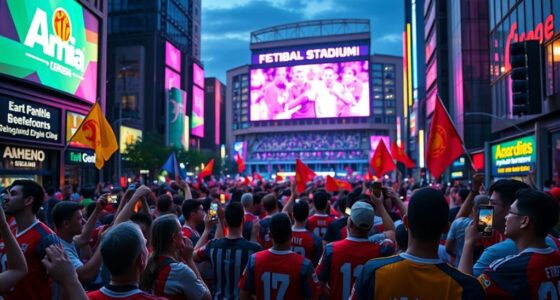Fantasy leagues deepen your emotional bonds with players and teams, fostering parasocial attachments. As you actively manage your team, track stats, and engage with other fans, your connection grows stronger, making you feel more personally invested in athletes’ successes and failures. This attachment can boost your loyalty but also lead to heightened frustration or obsession. To explore how these digital-driven bonds influence your sports experience, keep going and discover more.
Key Takeaways
- Fantasy leagues deepen emotional bonds by increasing active engagement and personal investment in players and teams.
- Participating in fantasy leagues fosters parasocial relationships through regular interaction and personalized team management.
- Active management activities enhance fans’ sense of control, strengthening attachment and loyalty to athletes and teams.
- Fantasy leagues create a shared community experience, amplifying emotional connections and social identity among fans.
- Digital innovations like real-time stats and virtual interactions intensify parasocial bonds and emotional engagement with sports.
The Rise of Fantasy Leagues in Modern Sports Culture

The popularity of fantasy leagues has surged alongside the growth of modern sports culture, transforming how fans engage with their favorite teams and players. Fantasy sports have become a cornerstone of digital fandom, allowing you to actively participate rather than passively watch. Instead of just following scores, you draft players, set lineups, and compete with others, deepening your connection to the sport. This digital engagement enhances your experience, making every game more exciting and personal. As more fans join fantasy leagues, they feel a sense of ownership and involvement that traditional viewing can’t provide. The rise of these leagues reflects a shift toward interactive, tech-driven fandom, where your choices and strategies become central to your sports passion. Additionally, the emergence of remote hackathons demonstrates how digital platforms can facilitate collaboration and innovation across geographical boundaries, much like the interconnectedness fostered by fantasy leagues.
Understanding Parasocial Relationships in Sports Fandom

As a sports fan, you often develop strong emotional bonds with players, feeling connected even if you’ve never met them. Engaging in fantasy leagues enhances this attachment, making players feel like part of your team and identity. These relationships foster a sense of community, giving you a shared experience that deepens your overall fandom. Additionally, the emotional connections formed through parasocial relationships can be similar to those experienced in Free Floating social environments, where bonds are formed without direct interaction.
Emotional Bonds With Players
Many sports fans develop deep emotional bonds with players, often feeling as if they know them personally. You might follow their careers closely, analyzing player statistics to understand their strengths and consistency. These bonds grow stronger when players perform well or show resilience, making you feel connected beyond the game. Your support can influence your perceptions of team management decisions, feeling personally invested in trades or roster changes. This emotional attachment creates a sense of familiarity and loyalty, even if you’ve never met the players. Such connections foster parasocial relationships, where you experience genuine feelings of friendship or admiration. The role of color accuracy and visual fidelity in how players are perceived visually can also subtly influence your emotional connection to them. Ultimately, these bonds deepen your engagement with the sport, turning players into relatable figures and fueling your passion for the game.
Fantasy League Engagement
Engaging in fantasy leagues creates a unique way for fans to deepen their parasocial relationships with athletes. When you develop fantasy strategies, you actively analyze player performances and make decisions that mimic real-world team management. This involvement fosters a sense of connection, as you feel more invested in individual athletes’ careers and outcomes. Managing your league requires regular attention, from setting lineups to negotiating trades, which keeps you closely engaged with the sport beyond just watching. Your strategic choices and ongoing management create a personal stake in players’ success, strengthening your parasocial bond. This immersive experience transforms passive fandom into a more active, emotionally invested relationship, making you feel more connected to the athletes and the sport itself. Additionally, understanding parasocial relationships can help explain how fans develop such strong emotional ties through this active participation.
Identity and Community
Participating in fantasy leagues not only deepens your connection to athletes but also shapes your sense of identity within the sports community. As you engage more, your fan identity becomes more defined, reinforcing your role in the community. This participation fosters community building, giving you a shared space with fellow fans who share your passions and rivalries. Through these leagues, you find a sense of belonging and purpose beyond just watching games. Your interactions with other players and fans help solidify your place within the larger sports culture. Additionally, engaging with essential oils for community bonding can enhance your emotional well-being and strengthen your social connections in sports fandom.
The Psychological Appeal of Building a Dream Team

Building a dream team in fantasy leagues taps into your desire for control and mastery over a personal sports universe. You’re drawn to player psychology because selecting athletes with specific traits or stories makes the experience more meaningful. Crafting a cohesive team also taps into your understanding of team dynamics, as you balance star power with performance upgrades. This process sharpens your strategic thinking and nurtures a sense of achievement when your lineup performs well. It’s satisfying to see your decisions translate into wins, reinforcing your confidence and skill. Ultimately, building your team feeds your need for agency and personal connection to the game, making each victory feel like a triumph of your insight and judgment.
Digital Engagement and Emotional Investment

When you engage with fantasy leagues online, you start building virtual bonds that feel surprisingly real. As your emotional investment grows, you become more connected to your team and its players. This active engagement fuels your loyalty, making the experience more personal and meaningful. Interestingly, such parasocial attachments mirror certain aspects of espionage relationships, where emotional bonds can influence perceptions and decisions.
Virtual Bonds Strengthen
Virtual bonds in fantasy leagues grow stronger as players actively engage with digital platforms, fostering deeper emotional connections. This virtual intimacy makes you feel more connected to your team, your opponents, and the game itself. As you check updates, make trades, and follow stats, your emotional investment deepens, creating a sense of ownership and attachment. The digital environment encourages ongoing interactions that reinforce these bonds. You might experience camaraderie through chat groups or rivalry through competitive leagues, which intensify your engagement. These interactions help transform a simple game into a meaningful experience, strengthening your parasocial relationship with the fantasy community. Regularly interacting with league members enhances your sense of belonging. Tracking your team’s progress fuels emotional investment. Sharing wins and losses deepens virtual intimacy. Additionally, integrating advanced fraud detection techniques can protect your league from disruptions and maintain trust within the community.
Emotional Investment Deepens
Digital engagement in fantasy leagues deepens your emotional investment as you follow every update, analyze stats, and make strategic moves. This heightened involvement taps into fantasy psychology, where your sense of control and mastery enhances attachment to your team. According to attachment theory, this bond grows stronger as you invest time and emotion into your fantasy roster, creating a parasocial relationship with players and teams. You experience excitement when your choices pay off and frustration when they don’t, mirroring real-life emotional responses. This process intensifies your connection, making the league feel personal. Your commitment isn’t just about competition; it’s about forming an emotional attachment that reflects underlying psychological needs for connection and achievement. Digital engagement transforms casual interest into a profound, emotionally charged experience.
Engagement Fuels Loyalty
Engagement in fantasy leagues strengthens your loyalty by continuously involving you in the game’s ongoing developments. Tracking player statistics keeps you invested, as every update can influence your decisions and strategies. When you actively participate in league management, you feel more connected to the sport and your team. This ongoing interaction fuels your emotional attachment, making you care beyond just watching. To deepen your engagement, consider:
- Regularly analyzing player statistics to optimize your lineup
- Participating in league discussions and polls
- Monitoring live updates and adjusting your strategies accordingly
- Creating a personalized space within your league platform can enhance your overall experience and foster a stronger sense of community.
How Fantasy Leagues Foster Personal Connections With Players

Fantasy leagues create a sense of personal connection with players by allowing you to follow your chosen athletes closely and make decisions that directly impact your teams. When you draft players, you develop a sense of loyalty toward them, rooting for their success beyond the game. Your fantasy strategy involves tracking player performance, injury updates, and matchups, which deepens your engagement. As you adjust lineups and trade players, you feel more connected to their careers and achievements. This ongoing involvement fosters a parasocial bond, where you feel personally invested in athletes’ successes and struggles. By actively managing your team and making strategic choices, you’re not just a casual fan—you become emotionally intertwined with the players you select. Additionally, affiliate disclosures ensure transparency about the financial relationships involved in fantasy sports platforms and related content.
The Impact of Parasocial Attachment on Fan Behavior

How does parasocial attachment influence how fans behave? It deepens your emotional bond with players, often shaping your fan identity and driving your actions. The psychological effects can lead you to feel as if you truly know the athlete, impacting your responses during games and social interactions. This attachment might make you more invested, increasing loyalty and emotional reactions. You may also experience heightened frustration or joy based on players’ performances. Engaging in mindful decluttering strategies of your fandom can help manage emotional investment and maintain a healthy perspective.
Navigating the Boundaries Between Admiration and Obsession

While it’s natural to admire and connect deeply with athletes, it’s important to recognize where that admiration crosses into obsession. Understanding player psychology can help you maintain perspective, reminding you that athletes are individuals with vulnerabilities, not idols. Fandom rituals, like wearing jerseys or following social media obsessively, can reinforce your bond but also blur boundaries. To navigate this line, stay aware of your emotional responses—are you celebrating or obsessing? Set healthy limits on your engagement, ensuring your admiration remains positive rather than consuming. Remember, your connection should uplift your enjoyment without fueling unhealthy fixation. Maintaining balance allows you to appreciate athletes authentically while avoiding the pitfalls of obsession. Recognizing the impact of parasocial attachment can help you stay grounded in reality and foster healthier fandom habits. Keep your admiration rooted in respect, not fixation.
Future Trends: Digital Innovations and Changing Fan Dynamics

Advancements in digital technology are reshaping how fans engage with athletes and their favorite leagues. Virtual reality offers immersive experiences, putting you courtside or behind the scenes without leaving home. Augmented interfaces enhance live viewing, allowing you to access real-time stats and interactive content seamlessly. These innovations deepen your parasocial bonds, making you feel more connected and involved in sports communities. Expect more personalized, interactive experiences that blur the line between virtual and real. As technology evolves, you’ll see fans adopting new ways to connect, compete, and celebrate sports. Digital innovations like virtual reality and augmented interfaces will continue to transform fan dynamics, fostering stronger attachment and engagement. Support hours for digital platforms may vary, impacting how and when fans access these innovations. Get ready for a future where your sports experience becomes more immersive and interactive than ever before.
Frequently Asked Questions
How Do Fantasy Leagues Influence Real-World Sports Viewership?
You might notice that your interest in real-world sports changes based on how engaged you are in fantasy leagues. When your fantasy engagement increases, your viewership patterns tend to shift, often leading to more frequent and longer viewing sessions. This heightened involvement makes you pay closer attention to games, players, and stats, which boosts overall sports viewership. So, your participation directly influences how much you watch and follow sports events.
Can Parasocial Relationships Lead to Unhealthy Fan Behaviors?
Like a modern-day Icarus, you might soar too close to the sun of fandom, risking emotional dependence and obsessive behaviors. Parasocial relationships can blur boundaries, making you feel personally connected to distant figures. This attachment can lead to unhealthy behaviors, such as neglecting real-life relationships or experiencing intense emotional highs and lows. Recognizing these patterns helps you maintain balance, ensuring your passion remains a source of joy rather than a trap.
What Role Does Social Media Play in Strengthening Fan-Player Bonds?
Social media plays a big role in strengthening fan-player bonds by boosting player engagement and deepening emotional investment. When you follow players online, you get real-time updates and behind-the-scenes content, making you feel more connected. This direct access encourages you to engage more actively, fostering a sense of personal closeness. As a result, social media enhances your emotional attachment and makes interactions with your favorite players more meaningful.
Are Younger Fans More Susceptible to Parasocial Attachments?
You might notice that younger fans are more emotionally susceptible to forming parasocial attachments. Their high youth engagement with athletes often leads to stronger emotional bonds, as they spend more time consuming content and engaging with social media. This increased exposure makes it easier for them to develop one-sided relationships, where they feel connected to players even without direct interaction, highlighting their vulnerability to parasocial attachment.
How Might Virtual Reality Change Fantasy Sports Experiences?
Virtual reality will transform your experience by offering immersive environments, making you feel truly part of the game. With avatar customization, you can create a personal presence, enhancing engagement and connection. Virtual immersion lets you analyze plays from different perspectives and interact with other fans in real-time. This technology deepens your involvement, making fantasy sports more exciting and realistic, ultimately changing how you enjoy and connect with sports content.
Conclusion
Just like Icarus reaching for the sun, your passion for fantasy leagues can lift you high or lead to a fall. As you build your dream team and forge bonds with players through screens, remember to keep your feet on the ground. Embrace the thrill of the game without losing yourself in the glow of parasocial relationships. Balance and perspective will help you enjoy the game’s magic without flying too close to the sun.









